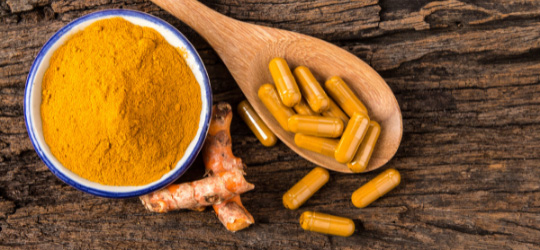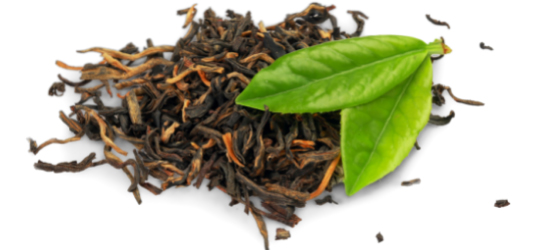While supplements aren’t replacements for quality sleep and movement, they can be useful tools to round out your overall recovery plan.
Because there are many roads that lead to better recovery—from reducing stress, to sleeping sounder, to reducing inflammation, etc.—there are many categories of recovery-boosting supplements to choose from.
In this lesson, we’ll focus on three of the most well-documented in the following categories: anti-inflammatory, adaptogenic, and relaxation-promoting.
Anti-inflammatory

As we’ve covered in previous lessons, short-term inflammation isn’t a bad thing. In fact, it’s a necessary part of the training/adaptation process.
But when your body is chronically inflamed, it’s important to turn that pathway off to promote your parasympathetic, rest-and-recovery system.
One supplement that’s particularly effective at this is curcumin, which is derived from turmeric.
Research consistently agrees that curcumin notably reduces inflammation in all bodily systems and reduces osteoarthritis symptoms.
Since curcumin isn’t well absorbed by the body on its own, many brands combine it with ingredients like lipids or black pepper extract to increase absorption.
We highly recommend using examine.com to research and learn more about what doses are the most effective for each brand.
Adaptogenic

Adaptogens are herbal pharmaceuticals that directly and indirectly affect mood states, cognition, sleep, and brain health—all very important for managing stress and boosting recovery!
One of the most researched adaptogens is rhodiola rosea, and for good reason. Ample evidence supports rhodiola supplementation as a potent way to reduce stress-related fatigue and weariness, and even boost mood.
For preventing fatigue, evidence suggests that doses as low as 50 mg/day of rhodiola can be effective.
If your goal is to actively reduce existing stress and fatigue, doses of 288-600 mg/day are more commonly used in research.
Remember, monitoring your stress levels with the Morpheus recovery score can help you decide if you should preventively protect against stress or more actively manage it.
Relaxation-promoting

If you’re grappling with mental stress, being able to relax is crucial to shutting down your sympathetic ‘“fight or flight” response and promoting recovery.
We covered several mental performance strategies for releasing stress and refocusing in the lesson on relaxing your brain. That’s one line of defense against mental stress.
Another promising tool for relaxation is supplementing with L-theanine.
Multiple studies support that L-theanine, amino acid found naturally in tea leaves, notably boosts relaxation and has the potential to stimulate deeper, higher-quality sleep.
Common doses for these stress-fighting effects are between 100-200 mg/day.
Because L-theanine promotes relaxation without sedative effects, people often consume it with caffeine to feel alert without the jitters.
So, you don’t necessarily have to skip that coffee to enjoy the calming benefits of L-theanine.
What about other supplements?
Think of this as a well-researched foundation for you to build off of. There are many other supplements that can bolster recovery based on your specific deficiencies, goals, and needs.
An excellent tool to help you personalize your supplementation strategy is examine.com.
Think of it as a supplement encyclopedia. You can search and see how well-supported each supplement’s benefits are by research, what doses are most effective, what downsides, risks or drawbacks supplements have, and many other key details.
Like all of the strategies covered in these lessons, we encourage you to incorporate, adapt, and disregard our suggestions until you’ve discovered your favorite, go-to recovery arsenal.
Use Morpheus as a guide to what’s working as you monitor your recovery score through this process.
Action Step:
Check out examine.com and search for one of the supplements we discussed in this lesson.
If they seem like a good fit for your recovery plan, make sure to order from a high-quality source.
These sources will show scientific validation from a third-party and independent testing for purity and quality.
Some examples include:
- Thorne
- Douglas Labs
- Pure Encapsulations
- Designs for Health
